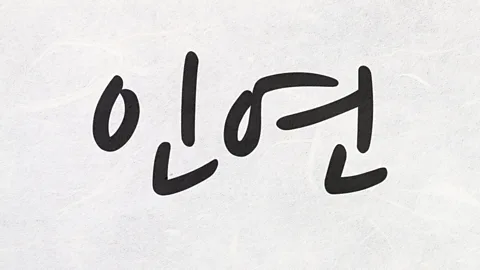Past Lives: This untranslatable Korean word for eternal love has ancient Buddhist roots
 A24
A24Greta Lee, Teo Yoo and John Magaro star in Celine Song's Oscar-nominated film Past Lives, which explores the word inyeon, the ancient concept of fated love.
Which word would you use to describe someone that you had held hands with, but never kissed? Perhaps you were childhood sweethearts who reconnected as adults, but you had never said the words "I love you". How would you describe your relationship to someone who you rushed home to talk on the phone with, but never dated? What would you call someone that you may have loved in a past life? In English, that word might combine the intensity of "soulmate" with a more innocent version of "situationship". In Korea, however, it is encapsulated in the word inyeon.
In 2023, Celine Song brought her interpretation of inyeon to life in her directorial debut Past Lives – a bilingual Korean and English film in which the word is also its central theme. Nominated for best picture and original screenplay Oscars, it follows main character Nora Moon (played by Greta Lee) as she migrates from Seoul to New York via Canada, and navigates her relationships with two loves – her husband Arthur (John Magaro) and her childhood best friend Hae Sung (Teo Yoo), with whom she reconnects as an adult.
Nora first introduces inyeon in a voiceover as a visual montage weaves together scenes from her first meeting with Arthur with scenes showing Hae Sung's move to China and subsequent encounter with another woman there. She describes the word to Arthur like this: "It means providence or… fate. But it's specifically about relationships between people. I think it comes from Buddhism and reincarnation. It's an inyeon if two strangers even walk by each other on the street and their clothes accidentally brush. Because it means there must have been something between them in their past lives. If two people get married, they say it's because there have been 8,000 layers of inyeon over 8,000 lifetimes."
Since the success of the film, Song has described inyeon in her own words by calling it a commonplace word in Korea, "something Koreans say to seduce someone" (also a line from the film) and a word deeply connected to Eastern philosophy, distinguishing it from Western concepts of destiny as "something that you cannot stop from coming to you". But what does the word really mean and how does Song's description of the word, both in the Past Lives script and in real life, relate to its real meaning?
In search of a dictionary definition
Dr Lisa Jeon, an adjunct professor of Linguistics at the University of North Texas, says the most common way that Koreans use inyeon is to suggest that it is an all-powerful, predestined force that cannot be changed, regardless of one's will.
However, the use of the word and what it actually means is complicated by a number of factors: Korean is generally considered a "listener-responsible" language, meaning the onus is on the listener to understand what the word means based on context. This specific word happens to have various meanings, so it's possible that the speaker's meaning could differ from the listener's interpretation of it. And while the word has roots in Buddhism, it has become almost entirely disassociated with the Buddhist religion in use and taken on a more secular meaning over time.
 A24
A24The word's actual definition, according to Dr Jeon, can range from four different meanings: the ties between two people over the course of their lives; fate, destiny, or a predestined relationship; a karmic and dharmic [moral order] connection; the consequences of cause and effect. It's not easy to pin down an English counterpart because the word has so many nuances, she says.
More like this:
That context is also necessary in understanding the use of inyeon in Past Lives. Towards the end of the film, Nora explains to Hae Sung that their relationship was not meant to be, using the word in a romantic context: "But in this life, we don't have the inyeon to be that kind of person to each other." Later that evening, Hae Sung asks a question connoting the word's dharmic meaning instead: "If this is also a past life, do you think we already have a new inyeon to one another in our next life?" Depending on how you believe the characters are using the word, the interactions in Past Lives can either be platonic, or risk crossing an extramarital boundary.
Forgotten Buddhist roots
The word's etymology is as hard to pin down as its dictionary definition. According to Jaehee Han, professor of Culture Studies and Oriental Languages at Dongguk University, inyeon comes from the Sanskrit hetu-prataya – a word meaning "causes'' and "conditions'' that can be found in Buddhist text dating as far back as the 2nd Century. While the two words are related to one another, hetu-prataya does not equate to inyeon in terms of "fate". He says that word, like Buddhism itself, likely traveled from India via China and arrived in Korea sometime during the late Goguryeo Dynasty (37 BC-668 AD).
 Getty Images
Getty ImagesDr Victor Fan, a reader at the department of film studies at King's College London who has written about the use of Buddhism in films, explains the concept of inyeon as it relates to hetu-prataya like this: "On a day-to-day basis, I often believe that I exist, and my existence seems to come from a permanent self. Buddhism does not deny that I exist, but my existence does not come from a singular self, but from a network of conditions: rain, air, my parents, my friends, or even the society at large. If I believe in transmigration (the existence of past lives), the memories of those past lives are still affecting the way I think, feel, act, and speak even in a subtle way."
While the religious definition of the word may be used in certain circles, the word – commonly heard in daily conversations and used as a theme on television shows and songs – rarely takes into account its Buddhist history.
It is uncertain when inyeon began to take on a more secular meaning, but one clue may exist when looking at the word's Chinese characters. "Although Chinese and Korean are genetically unrelated, Chinese was the first language in East Asia to be written down, so it has been a source of thousands of borrowed terms over the centuries," Dr Jeon says, adding that it's likely that the idea of "predestiny" was built into the original Chinese. While there are small differences in the word's use, it exists across several languages that have been influenced by Chinese. The word's equivalent, for instance, is mìng yùn in Mandarin, innen in Japanese and nhân duyên in Vietnamese.
 A24
A24One of the reasons that the word's Buddhist roots may be overlooked in modern Korean society is a decline in the use of hanja. Hanja, or Sino-Korean, was a system of writing in Korean using Chinese characters before the invention of the modern Korean writing system, Hangul, in 1443. While Koreans still use Hanja to disassemble and study a word's meaning, one common misunderstanding about inyeon is that the in comes from the character for human (ingan) and connection (yungeol).
Individual interpretations of inyeon
"Of course, how one interprets [inyeon] could change the way one approaches the film," Dr Fan says in a discussion via email. Were Hae Sung and Nora destined to be, and did Arthur get in the way? Do you believe that the characters' outcomes and subsequent relationships were the result of actions and feelings? Or do you believe that their stories were determined by destiny?
Although Dr Fan does not believe that the expression of free will in Past Lives stays true to the Buddhist meaning of inyeon, he argues that a Buddhist interpretation of the film is not necessary. Instead, it's an opportunity for the viewer to examine the filmmaker's relationship to the concept and perhaps, our own as well.
Engaging with the idea is more important than whether the film is giving us a correct definition and representation of a philosophical concept, he says. "It is in itself a beautiful way to draw our attention to the interconnectedness of all sentient beings, especially those people whom we love and care about deeply."
Past Lives is available to stream now on Prime Video and Paramount+.
--
If you liked this story, sign up for The Essential List newsletter – a handpicked selection of features, videos and can't-miss news delivered to your inbox every Friday.
If you would like to comment on this story or anything else you have seen on BBC Culture, head over to our Facebook page or message us on Twitter.
